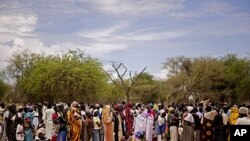The United Nations reports thousands of people are fleeing the conflict in the disputed Abyei region between north and south Sudan. Aid agencies describe the situation as volatile, with sporadic shooting and looting reported.
Before northern Sudanese troops marched into Abyei and fighting erupted last week, an estimated 110,000 people lived in the town. Now, air and road patrols by UNMIS, the U.N. Mission in Sudan, report few civilians are present.
The United Nations says humanitarian organizations in Abyei have had their offices ransacked and stocks of emergency relief items looted. Many aid workers have left the area because of insecurity.
Tens of thousands of internally displaced people reportedly have poured into Southern Sudan’s Warrap, Unity and Northern Bahr El Ghazal state. A spokesman for the International Organization for Migration, Jambe Omari Jumbe, says it is difficult to get an accurate count of the numbers fleeing.
“Many of them are still on the move and some of them are actually hiding in the bushes. But, according to some estimates … we know that between 20,000 and 30,000 people are actually on the move. Many are in need of food and water and with recent heavy rains may be vulnerable to water-borne disease and infections,” said Jumbe.
IOM is coordinating the delivery of emergency assistance to the internally displaced people. It is providing trucks, essential non-food relief items, fuel and medicines to support humanitarian operations.
Jumbe says a mobile clinic has been put on standby in Wau to provide help if requested by other humanitarian organizations in the area.
The World Health Organization reports the hospital in Abyei is not functioning. The health staff has deserted and gone to the southern Sudanese town of Agok.
WHO spokesman Tarik Jasarevic says many people have been treated for minor wounds and sprains. In addition, he says 70 surgical cases have been treated in Agok. Many are related to the conflict in Abyei.
He says the greatest needs are for shelter, food and water, and that existing primary health-care services are overstretched because of the large influx of IDPs (internally displaced people).
“It is expected that morbidity and mortality in children will be due to acute respiratory infections - diarrhea, malnutrition and malaria. The onset of the rainy season and population movement are likely to lead to an increase in these cases,” said Jasarevic.
Jasarevic says aid agencies are immunizing children under five against killer diseases. He says both UN and non-governmental agencies are sending surgical teams and critical medical supplies into the region.
Thousands Flee Violence in Sudan’s Abyei Region




